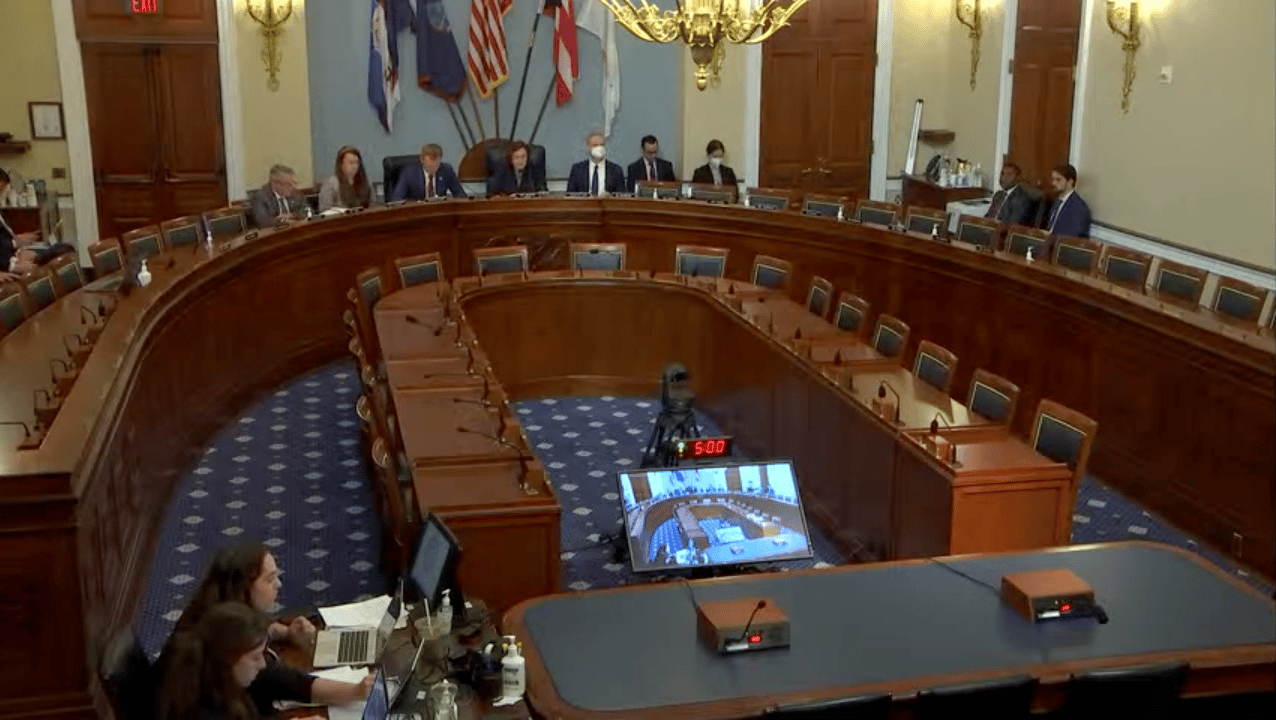On September 14, a congressional committee probed the history that PR firms have played in creating and spreading climate disinformation in order to block climate policy and promote fossil fuel interests.
The hearing, held by the U.S. House Natural Resources Committee, Subcommittee Oversight & Investigations, invited several firms, including Singer Associates, Story Partners, and Pac/West Communications. None of them showed up.
Instead, the hearing heard from several witnesses, including experts in the PR industry. One of them was Christine Arena, a former VP at Edelman who now researches and exposes greenwashing and industry obfuscation. Arena laid out three overarching campaign strategies that PR firms use on behalf of their fossil fuel clients, citing a study from Brown University researchers Robert Brulle and Carter Werthman. Those strategies are corporate image promotion, third-party mobilization (astroturf groups), and delegitimization of the opposition.
“The U.S. oil and gas sector has always pushed for policies that allow for new fossil fuel expansion, and against policies that would reduce demand,” Arena said in a prepared testimony. “But what has changed recently is the intensity of the industry’s pursuits, and the vast resources it deploys through public relations and lobbying efforts meant to crush potential regulatory obstacles in its path.”
The oil industry and its hired PR hands continue to deploy these strategies. A recent example Arena cited was the oil industry’s effort to opportunistically seize on Russia’s war in Ukraine to promote long-standing policy wishes, while misleading the public by blaming climate policy for causing higher energy prices.
These tactics are especially aggressive at the state and local level, where “brute financial force” is used to kill off climate initiatives, Arena added.
That power imbalance was on vivid display in Colorado in 2018 when grassroots activists succeeded in getting a ballot initiative put to voters that would have imposed greater setback distances on fracking operations, limiting how close to homes and schools new oil and gas wells could be drilled. A year earlier, two deadly oil and gas infrastructure explosions had rocked Firestone, Colorado.
The industry poured money into that election, outspending community and environmental groups by a factor of more than thirty to one. Noble Energy, a large fracking company (now owned by Chevron), hired DC-based PR firm Story Partners, to help defeat the measure. Story Partners created two astroturf campaigns, based on the firm’s research that showed that support for setback distances declined when voters heard about the “devastating consequences” that it would have on the state’s economy. The campaign ran ads to promote “clean” natural gas, warn of damage to Colorado’s economy, and positioned Noble Energy as a responsible partner. Story Partners still displays its campaign to defeat the ballot initiative on its website as a successful “case study” of how it protected its client’s assets.
The House committee also heard from Anne Lee Foster, who held an unpaid position in 2018 for Colorado Rising, a grassroots group supporting the ballot measure to establish drilling setback distances. She spoke about the multiple instances in which people would harass her and her colleagues as they tried to gather signatures.
Around that time, Colorado Public Radio reported that an internal Anadarko Petroleum document, leaked to Colorado Rising, asked employees to report the locations of signature gatherers via a phone texting system. Once the location was identified, counter-protesters appeared at a moment’s notice, shouting and harassing the signature gatherers and passersby who considered signing on to the ballot initiative effort.
According to a report produced by the House committee, oil companies including Anadarko Petroleum, Noble Energy, and Chevron, had set up two front groups, “Protecting Colorado’s Environment, Economy and Energy Independence” (Protect Colorado), and “Coloradans for Responsible Energy Development” (CRED). Those two groups then funneled most of their proceeds to an Oregon-based PR firm called PAC/West. The two front groups offered a “buffer” between the oil drillers and the PR campaign, the committee report said.
Although it was later deleted from its website, PAC/West described how it was paid by Anadarko Petroleum and Noble Energy to “lead a statewide education campaign” to defeat the ballot measure. Ultimately, the ballot measure was narrowly defeated at the polls in 2018.
“I personally suffered from what I feel is stalking or harassment in a number of other circumstances throughout this campaign,” Anne Lee Foster told the committee on Wednesday in her prepared testimony.
That was one small example of a web of influence between a handful of PR firms and the oil and gas industry. “Let me be clear: There is nothing standard or ethical about these practices. They are deceptive communications practices that mislead our citizenry and undermine our democracy,” Arena said.
The work that PR firms do goes far beyond simply promoting the image of their clients, according to Melissa Aronczyk, an associate professor at Rutgers University’s School of Communications & Information, another witness at the congressional hearing.
“Public relations firms often present themselves and their work in terms of facilitating or amplifying ideas or information. In fact, public relations is not only communicating ideas and information but coming up with those ideas and creating that information,” Aronczyk said in her testimony. PR firms provide long-term strategic planning, set up front groups, manufacture the illusion of support, and monitor and target opponents. She said the work goes back many decades.
PR firms also operate a broad network of influence out of public view, sharing information among multiple clients and trade groups, which allows companies to “minimize the reputational and financial risk of speaking out against climate action,” Aronczyk said.
“Because this coordinated infrastructure of anti-environmental action is operating behind the scenes, members of the public and lawmakers have no way of knowing if the campaigns operating on behalf of fossil fuels are real or manufactured,” she added.
But the growing pressure on the PR industry is having an effect. Clean Creatives, a climate campaign targeting the advertising industry, says that nearly 400 PR firms have signed a pledge to not work with coal, oil, and gas companies.
“We’re seeing the beginning of a transformation of the PR and Advertising industry when it comes to climate,” Duncan Meisel, executive director of the Clean Creatives campaign, said in a statement. “Oil and gas companies used to be seen as prestige clients, now agencies are embarrassed to admit that they work for them. But this dirty work is still going on in the shadows, making the spotlight of this House hearing and investigation all the more important. The future of creativity is clean and it’s time for agencies to step into the light.”
One PR firm was not at Wednesday’s hearing: FTI Consulting. The House committee is investigating FTI, which has refused to turn over documents requested by the congressional investigators.
“We initiated the subpoena process for FTI Consulting, which has one of the worst reputations in the business. The negotiations are ongoing. The trajectory is sadly not good,” Rep. Katie Porter said in her closing comments on Wednesday. “What are they trying to hide? Is it their creation of fake grassroots groups for their clients to hide behind? Was it the creation of fake social media profiles to track plans of activist groups? Or is there something worse? The harder FTI Consulting fights, the more it appears that they have a lot to lose by having their tactics exposed through oversight.”
She added: “We are just getting started.”
Subscribe to our newsletter
Stay up to date with DeSmog news and alerts







